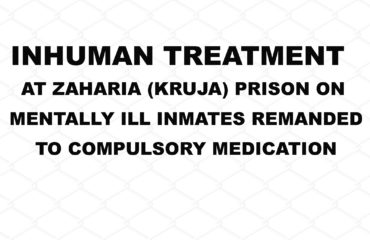A group of civil society organizations believe that the Normative Act with the power of a law no. 1, known as the Anti-KÇK package, goes against important principles that stand at the foundations of the rule of law, stipulated in the Constitution of the Republic of Albania and the jurisprudence of the Constitutional Court.
Despite a request of civil society organizations sent on February 5, 2020, to the Assembly of Albania, we note with regret that the two parliamentary committees (Committee of Laws and the Committee on Security Affairs), approved the normative act without any public consultation. Meanwhile, the normative act has been scheduled for review in the Assembly, in the plenary session of March 5, 2020.
Civil society organizations have prepared a detailed legal critique on the main violations noticed in the normative act (published on this link). Based on the arguments presented in the critique, we call on the Assembly to reflect positively and turn down the normative act with the power of a law proposed by the Council of Ministers.
With concern, we draw the attention of the Assembly of Albania that the Normative Act circumvents the country’s constitutional framework, violates the principle of the separation and balancing of powers, violates fundamental human rights and freedoms, including freedom of movement and the right to due legal process, weakens the legal and effective independence of the Prosecution Office and may damage the fight against organized crime, because the actions undertaken by the Operation Force of Law (OFL) as a structure of the executive, in some cases and with immediate effect according to this act, may be later rejected by courts as actions not in accordance with standards of the constitution or the European Convention of Human Rights.
If approved by the Assembly, the normative act may lead to the issuance of penalizing decisions by the Strasbourg Court, in favor of individuals, who are subjected to limiting measures and who may address this court in the future. In our legal critique, we analyze, among others, some decisions of the Strasbourg Court, among the most important being the unanimous decision of the Grand Chamber of this Court, De Thommaso, where Italy has been penalized for violating the right of movement and the right to due legal process, as a result of the implementation of an unclear and unpredictable legal framework for individuals, on preventive measures in the context of the fight against organized crime. We find similar lack of clarity and deficiencies in certain provisions of the normative act with the force of a law (analyzed in the legal critique).
The normative act overburdens SPAK and the Special Court against Corruption and Organized Crime with competences that are beyond constitutional ones, while these institutions are currently facing a voluminous number of carryover cases from previous justice bodies. We consider that this aspect and the involvement of the head of the Special Prosecution Office in the National Coordination Committee for the Prevention and Fight against Organized Crime, will lead to the weakening of the effectiveness of these specialized bodies, which should have under special focus of their activity, among others, the investigation and punishment of criminal offences committed by high-level officials or former officials. It is worth noting that the impunity of high-level officials has been one of the main reasons for reforming the justice system.
Signatory organizations:
- Albanian Helsinki Committee (AHC)
- Institute for Political Studies (ISP)
- BIRN Albania
- Albanian Institute of Science
- Cooperation and Development Institute (CDI)
- Urban Research Institute
- Institute for Democracy and Mediation (IDM)
- Albanian Disability Rights Foundation
- Partner Albania
- Res Publica
- Child Rights Center Albania (CRCA)
- Altri Center
- Center for the Study of Democracy and Governance
- Center for Legal Civic Initiatives (CLCI)
- European Center
- Civil Rights Defenders
- INAC
- Useful to Albanian Women
- Albanian Media Council
- LGBT Alliance
- Albanian Center for Economic Research (ACER)
- Gender Alliance for Development Centre
- AWEN- Albanian Women Empowerment Network





[…] the Albanian Parliament actually passed an even more disturbing piece of legislation, the so-called “Anti-KÇK” bill, thereby paving the way for the creation of an “elite” police force that, among other things, […]
[…] the Albanian Parliament actually passed an even more disturbing piece of legislation, the so-called “Anti-KÇK” bill, thereby paving the way for the creation of an “elite” police force that, among other things, […]
[…] periodo, il parlamento albanese ha anche approvato una legge ancora più preoccupante, la cosiddettalegge “Anti-KÇK”, spianando la strada alla creazione di una struttura di polizia “d’élite” che, tra le […]